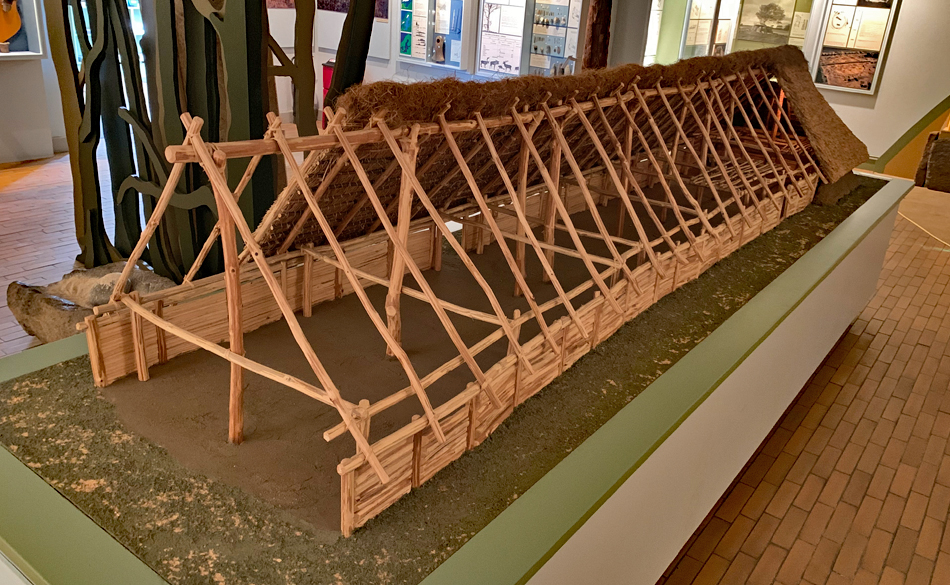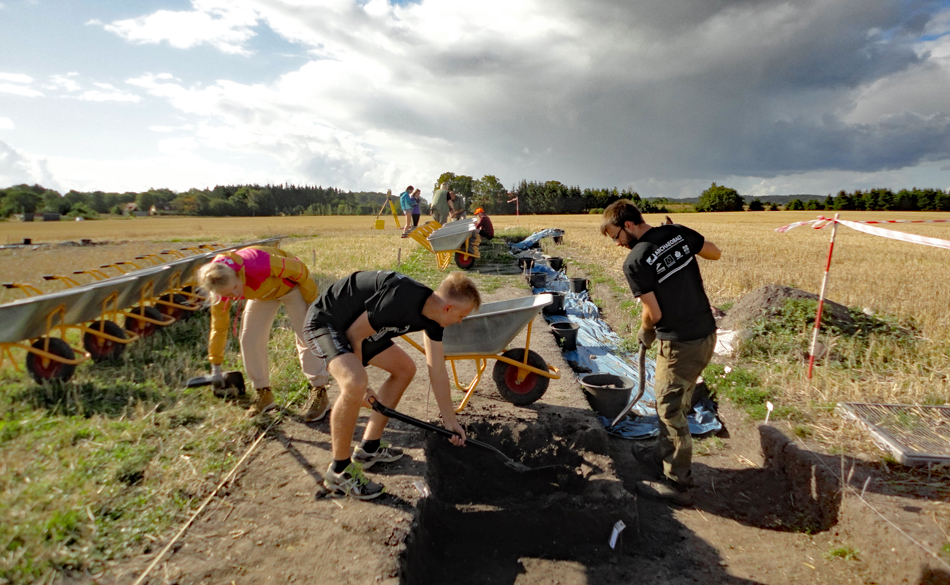All IFR field school applicants should familiarize themselves with IFR COVID-19 Practices before beginning the enrollment process. Program logistics are subject to change as health and risk management experts provide new recommendations and best practices. A Syllabus Addendum will be uploaded to each field school page and sent to all enrolled students with the latest operational and/or logistical changes to their program.
Overview
Sorte Muld, meaning black soil, is located in the Island of Bornholm, Denmark and has been referred to as “the field of gold” by medieval scholars because of the findings made there since early periods. Sorte Muld, is perhaps, the finest Iron Age – Early Viking settlement in Denmark and includes traces of settlements from c. 100 BC to AD 1000. The finds already made at the site and the area of the settlement still remaining in the countryside require scientific work. The purpose of research is to establish a general perspective on Sorte Muld and to conserve the history and the finds discovered at the site to be accessible to the public. This project seeks to understand the architectural pattern and use of a long house located near the main temple during the Early Viking Age. The primary excavation carried out at the site focuses on the main period of occupation, but in the upcoming season the aim is to discover more detailed answers to general questions regarding the Early Viking Age in the Baltic and North Europe. Students will take part in this process to unearth the significance of the site in the region during the Early Viking occupation, how the Vikings used or changed the previous Iron Age settlement, and generally, how everyday life of the Viking society residing in Sorte Muld looked like and functioned.
Instructors
The directors welcome emails and inquiries about the research elements of this project. More general information (tuition, health insurance, and payment schedule) can be found under the ‘Students’ tab above. Any further questions may be addressed to IFR staff. Additional details about research, course schedule, travel, accommodation, and safety can be found on the syllabus. Contacting the directors or the IFR office is encouraged and appreciated. It may help you determine if this field school is a good fit for you.
Testimonials
This is a new IFR field school. No student testimonials are available at this time.
Tuition Includes:
- Cost of Instruction
- Cost of Academic Credit Units
- Room Only
- All Local Transportation
- Health & Evacuation Insurance
Student Fees
This program requires an online application — there is no fee to submit an application. Once admitted, a payment of the nonrefundable deposit fee is required to secure a place in the program(s). The Tuition balance (total program cost minus the deposit fee) must be paid prior to the Tuition deadline as listed above under “Course Details.” A $200 late fee will be added to all accounts not paid in full by the Tuition deadline.
Early Decision Enrollment (Nov 1, 2019 through Jan 10, 2020): A reduced, nonrefundable $300 deposit fee is required to secure a seat in the program. This deposit is part of the total Tuition and NOT in addition to it.
Regular Enrollment (Jan 11, 2020 through payment deadline): A nonrefundable $500 deposit fee is required to secure a seat in the program. This deposit is part of the total Tuition and NOT in addition to it.
Late Enrollment (payment deadline forward): A nonrefundable $600 deposit fee is required to secure a seat in the program. In addition, a $200 late fee will be added to all accounts not paid in full by the Tuition payment deadline.
Withdrawal & Cancellation Policy: If you paid the deposit fee but did not cancel your participation by the Tuition payment deadline, you are legally responsible for the full Tuition regardless of attendance at any IFR program. Please carefully read our Withdrawal & Cancellation Policy for further information.
Credit Card Processing Fee: A 2.5% processing fee is automatically incurred for all credit/debit card/online payments.
Academic Credit Opt Out: Students who wish to participate in an IFR field school without earning academic credit units may do so and receive the following discounts: $300 off a full program (4 or more weeks in length) or $200 off a short program (2-3 weeks in length).
Trip Cancellation Insurance: The IFR does not provide trip cancellation insurance. Read this Wall Street Journal article about travel insurance — it may help in making a decision whether such insurance is for you. If you do wish to purchase such insurance, Insure My Trip or Travel Guard are two possible resources you may wish to explore.
Accommodations
The guest house is in the city of Åkirkeby in Bornholm. It has been adaptedinto comfortable cabins with beds (bathrooms with shower, WC, and heating system) in the guest house, which also provides free Wi-Fi. Participants are expected to bring sleeping bags and personal towels. Students will share a room based on gender and room size. Food is not included within the program due to the high cost involved to hire a cook or catering service. The house is, however, properly furnished with all the cooking appliances and refrigerators, so students can share the tasks of doing the shopping and cooking their own meals at a lower price.
In the city, there are several options of places where food can be bought for affordable prices (approx. 15 to 20 US dollars). Food stores are within a walking distance from the guest house.


Travel Info
We suggest you hold purchasing your airline ticket until six (6) weeks prior to departure date. Natural disasters, political changes, weather conditions and a range of other factors may require the cancelation of a field school. The IFR typically takes a close look at local conditions 6-7 weeks prior to program beginning and make Go/No Go decisions by then. Such time frame still allows the purchase deeply discounted airline tickets while protecting students from potential loss if airline ticket costs if we decide to cancel a program.
The guest house is in the city of Åkirkeby, approximately 15km from the capital of the island of Bornholm. The island of Bornholm is located to the northeast of Denmark. Students are expected to arrive at the Bornholm Airport or port in the city of Rønne on or before June 7, 2020. It takes approximately three hours for passengers and freight to travel between CopenhagenandRønne viaYstadinSweden by train or bus and then by ferry. There are also frequent flights between Bornholm Airport and Copenhagen Airport (25 minutes flight). It is important to check the low-cost flight options. Students will be met at the airport or the ferry dock by the project’s staff and taken to the guest house.
If you missed your connection or your flight is delayed, please call, text or email the project director immediately. A local emergency cell phone number will be provided to all enrolled students.
VISA REQUIREMENTS
All students are required to have a valid passport when traveling to Denmark. US citizens should ensure that their passport is valid for 6 months after their planned trip before traveling to Denmark. Citizens of EU, EEA, USA, Canada, Japan, Republic of Korea, Australia, New Zealand and some countries in Latin America do not need a visa to Denmark for this field school. Citizens of other countries may need a visa, so we recommend consulting the nearest Danish embassy website for specific visa requirements. Where necessary, the BARC can send an official invitation letter that should be used at the relevant embassy to secure a visa to the program.
Student Safety
The IFR primary concern is with education. Traveling and conducting field research involve risk. Students interested in participating in IFR programs must weigh whether the potential risk is worth the value of education provided. While risk is inherent in everything we do, we do not take risk lightly. The IFR engages in intensive review of each field school location prior to approval. Once a program is accepted, the IFR reviews each program annually to make sure it complies with all our standards and policies, including student safety.
Students attending IFR international programs are covered by a comprehensive Health Insurance policy that includes physical illness or injury, mental or chronic conditions. No deductible and 100% of costs are covered up to $250,000. In addition, we provide Political and Natural Disaster Evacuation policy, which allow us to remove students from field school location if local conditions change. Our field school directors are scholars that know field school locations and cultures well and are plugged in into local communities and state institution structures.
Students attending IFR domestic programs (within the US) must have their own health insurance and provide proof upon enrollment. IFR field school directors are familiar with local authorities and if in need of evacuation, local emergency services and/or law enforcement will be notified and activated.
The IFR has strong, explicit and robust policy towards discrimination and harassment in the field. If students feel they cannot discuss personal safety issues with field school staff, the IFR operates an emergency hotline where students may contact IFR personnel directly.
Call us at 877-839-4374 or email us at info@ifrglobal.org if you have questions about the safety of any particular program.

















